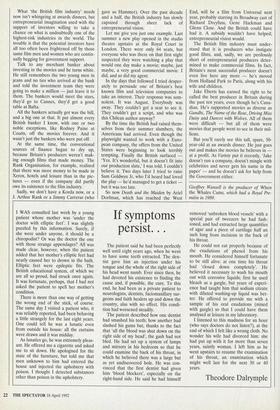If symptoms persist.. .
I WAS consulted last week by a young patient whose mother was 'under the doctor with elliptic feet'. I was slightly puzzled by this information. Surely, if she were under anyone, it should be a chiropodist? Or was the doctor the one with those strange appendages? All was made clear, however, when the patient added that her mother's elliptic feet had nearly caused her to drown in the bath. Elliptic feet were epileptic fits. The British educational system, of which we are all so proud, had struck once again. It was fortunate, perhaps, that I had not asked the patient to spell her mother's condition. I WAS consulted last week by a young patient whose mother was 'under the doctor with elliptic feet'. I was slightly puzzled by this information. Surely, if she were under anyone, it should be a chiropodist? Or was the doctor the one with those strange appendages? All was made clear, however, when the patient added that her mother's elliptic feet had nearly caused her to drown in the bath. Elliptic feet were epileptic fits. The British educational system, of which we are all so proud, had struck once again. It was fortunate, perhaps, that I had not asked the patient to spell her mother's condition.
There is more than one way of getting the wrong end of the stick, of course. The same day I visited a patient who, it was reliably reported, had been behaving a little strangely for the last eight years. One could tell he was a lunatic even from outside his house: all the curtains were drawn and it was midday.
As lunatics go, he was extremely pleas- ant. He offered me a cigarette and asked me to sit down. He apologised for the state of the furniture, but told me that men unknown to him had entered the house and injected the upholstery with poison. I thought I detected substances other than poison in the upholstery.
The patient said he had been perfectly well until eight years ago, when he went to have some teeth extracted. The den- tist gave him an injection under his tongue and the whole of the right side of his head went numb. Ever since then, he had devoted his existence to finding the cause and, if possible, the cure. To this end, he had been as a private patient to neurologists, dentists, faciomaxillary sur- geons and faith healers up and down the country, alas with no effect. His condi- tion had worsened steadily.
The patient described how one dentist had smashed his teeth; how another had slashed his gums but, thanks to the fact that 'all the blood was shut down on the right side of my head', the gash had not bled. He had set up a, system of lamps and mirrors in his bedroom so that he could examine the back of his throat, in which he believed there was a large but as yet undiscovered hole. He was con- vinced that the first dentist had given him 'blood blockers', especially on the right-hand side. He said he had himself removed 'unbroken blood vessels' with a special pair of tweezers he had fash- ioned, and had extracted large quantities of agar and a piece of cartilage half an inch long from incisions in the back of his throat.
He could not eat properly because of the exudations of phenol from his mouth. He considered himself fortunate to be still alive: at one time his throat had 'closed down completely'. He believed it necessary to wash his mouth out with corrosive liquids; first he used bleach as a gargle, but years of experi- ence had taught him that sodium citrate with diluted washing-up liquid was bet- ter. He offered to provide me with a sample of his oral exudations (mixed with gargle) so that I could have them analysed at leisure in my laboratory.
I listened to this madness for an hour (who says doctors do not listen?), at the end of which I felt like a wrung cloth. No wonder his wife had divorced him: she had put up with it for more than seven years, saintly woman. I left him as he went upstairs to resume the examination of his throat, an examination which might well last for the next 30 or 40 years.
Theodore Dalrymple


















































 Previous page
Previous page